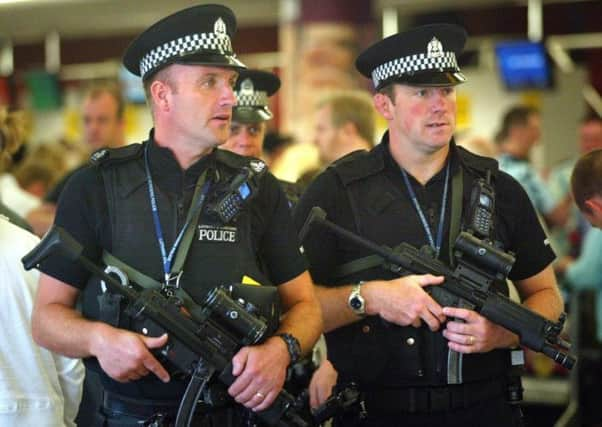Armed police ‘must not be elite unit’


Sir Stephen House, the chief constable of Police Scotland, has made an outspoken defence of the highly controversial move to arm hundreds of police officer across the country.
Arguing that it was important that armed police took part in routine police duties, House said Police Scotland could not “afford” to have them “sitting beside the side of the road” waiting to respond to a serious incident.
Advertisement
Hide AdAdvertisement
Hide AdInstead, all police officers, including those who are permitted to carry guns, should be contributing to ordinary policing the chief constable stated.
“I don’t want people to get the idea that these fire arms officers stand off and are not police officers [and] actually are some sort of paramilitary,” House said.
“They are police officers. They joined the police. They have got many years service. They are experienced officers whose judgement is well trusted and they put themselves through very gruelling firearms selection courses and training courses. But they remain police officers. I would not want it any other way.
“If you make them into some elite unit who do not get involved in day-to-day policing then they never talk to the public and are simply deployed to deal with fire arms incidents.”
He added: “We should encourage fire arms officers to get involved in day to day policing activity because that keeps them real as police officers.”
House made his remarks in front of the Scottish Police Authority, the body set up to scrutinise the new single force’s activities, when it met in Selkirk last week.
Earlier this year it emerged that officers are regularly carrying handguns while on routine duties when Police Scotland admitted 440 specialist firearms officers had been authorised to carry weapons by House.
The revelation that Armed Response Vehicle (ARV) crews were dealing with missing persons and road accidents was criticised by politicians who were concerned by the shift away from what has traditionally been an unarmed force.
Advertisement
Hide AdAdvertisement
Hide AdIn Selkirk, House dismissed some of the criticism as “almost mischievous” adding that he did not think it was the “big issue people say it is”.
Responding to those who have asked why armed officers are required in quiet country areas such as the Highlands, House cited the gun massacre at Dunblane, Hungerford and also the shootings by Derrick Bird in Cumbria, saying that they had taken place in areas where violent crime was uncommon.
He also quoted recent cases of an armed robbery in Inverness and an incident, which involved a man with a shotgun in a housing estate in the capital of the Highlands.
“I will not place barriers in the way of police officers who are required by their duty and their training to put themselves in harm’s way when fire arms incidents occur. I won’t say to them you have got to spend an extra 5/10/15/20 minutes arming yourselves before you deal with this incident,” House said.
House said he did not know of a single incident in the UK where a police officer had had a gun removed by a criminal – pointing out that the glocks carried by Scottish police are extremely difficult to remove from their holsters.
He added that an experienced armed policeman had recently made the point that officers in charge of weapons held in safes in police vehicles were vulnerable to knife- wielding criminals unless they themselves were armed.
Last night Labour’s justice spokesman and former senior police officer Graeme Pearson said the decision to deploy more armed officers should not have been taken without wider consultation with the public.
Pearson said: “Is it right that this decision was taken without the consent of the general public? This has been a very significant move and it deserved a public debate ahead of it being introduced.”